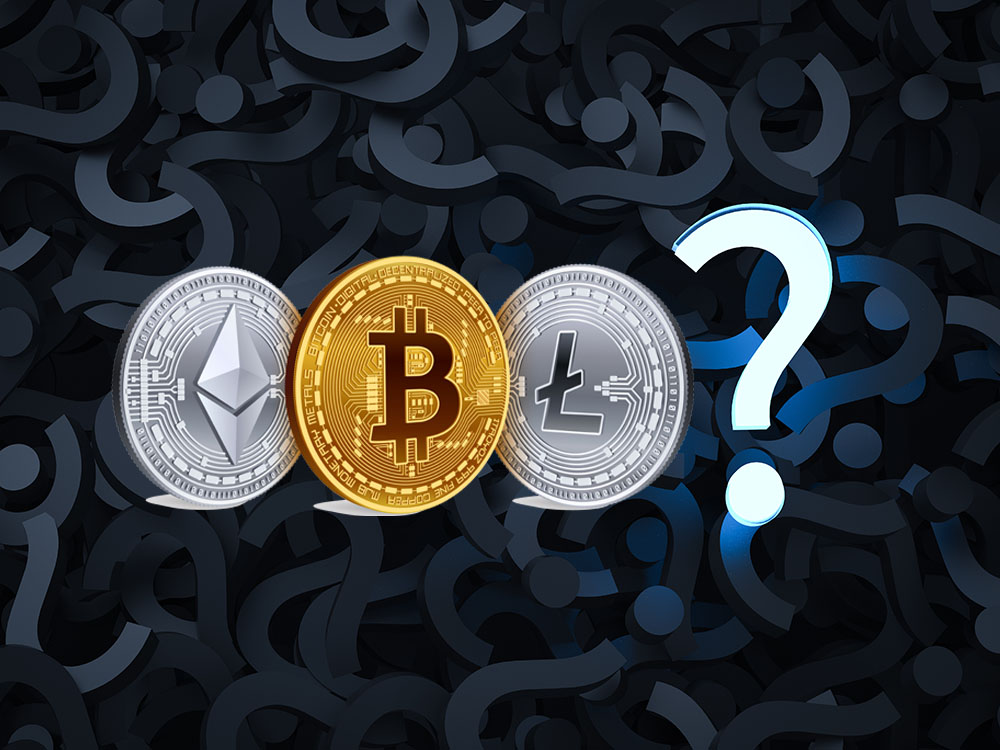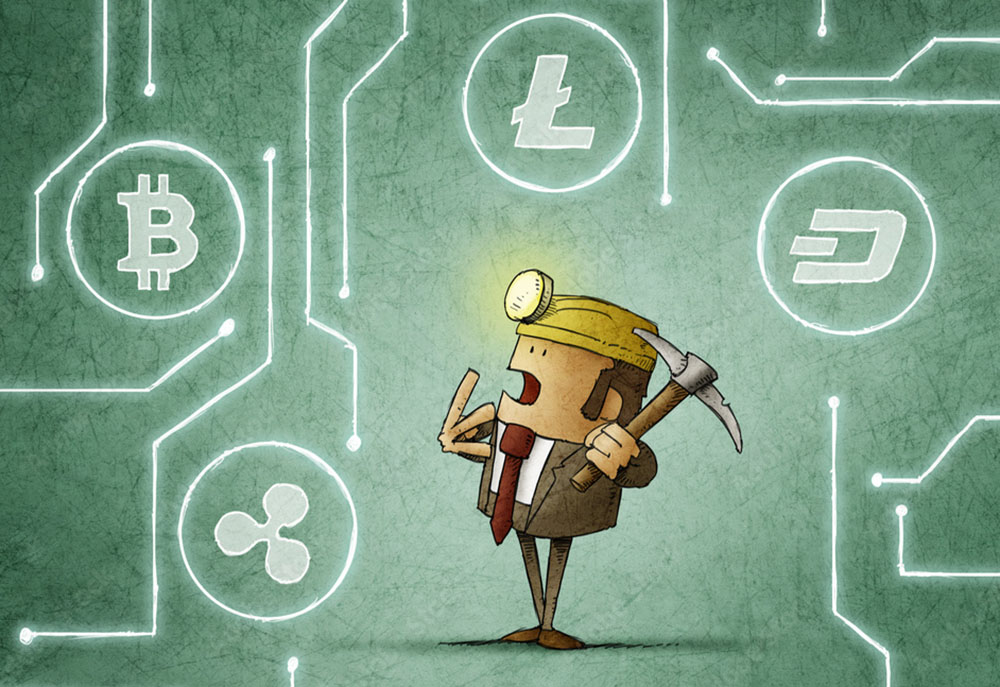Crypto For Beginners: How Does Internet Money Work?
- By: Sean van der Merwe on December 4, 2021
- Categories: Cryptocurrency

By now, we’re sure that you have heard about cryptocurrency. Bitcoin, for instance, has been a trending word in the fringe investment circles for a few years now. Stock exchange purists seem to have preferred their usual investments up till now, but even wealthy men like Elon Musk and others are dabbling in the crypto world now. The truth is, there is a lot of money to be made with internet money and virtual tokens.
There has been a tremendous amount of negative talk about cryptocurrency in the past. The truth is people are often scared of what they don’t understand. To make the situation worse, scammers have preyed on the ignorance of the mass population for a long time. As more and more people uncover the truth about crypto and embrace the Bitcoin lifestyle, the less traction criminals have in the market space. Those who know the concept and its principles can spot a scam from a mile away.
If you’d like to learn more about the basics of Bitcoin and other internet virtual money forms, then pay close attention to the details in this crypto for dummies guide.
Internet Money – What is Cryptocurrency?
Cryptocurrency is an internet money form that can be exchanged online for goods and services. While the most prominent versions of the currency are internationally acclaimed currencies like Bitcoin, Ethereum, Litecoin, and others, some companies issue their own cryptocurrency tokens for exclusive use on their retail platforms.
Pure crypto is made up of digital hash codes. There is no physical coinage represented. Instead, the digital coins/codes are stored in digital blockchain wallets. The currency is recorded and transferred by way of a public ledger, called a blockchain. It is called this because it is made up of various data blocks. Blocks are nothing more than groups of transactions.
A blockchain is a decentralized web-based internet money management system that records and facilitates direct, peer-to-peer crypto transfers. This means that you can manage your funds and make transfers without going through a middleman (banking system). Gone are the days when banks and political agendum can manipulate the value of your business.
Each transaction you make on the blockchain must go through a verification process first. In fact, multiple mining nodes must “okay” the transaction before the transfer is successfully made. This way, transactions cannot be duplicated, nor can they be reversed. Each new transaction carries a unique hash code that tells a full history of the payment, validating both the sender and benefactor.
Codes, Codes, and More Codes
It’s important to understand that cryptocurrency is all about hash codes. Below we will paint you a workable picture with a simple crypto for dummies analogy:
- You store codes (cryptocurrency) that are valuable in your code garage (crypto wallet).
- You send codes worth value from your code garage (crypto wallet) address via the code highway (blockchain).
- The recipient receives and stores the codes (Bitcoin, etc) in their code garage (crypto wallet).
- The codes you own are protected by a private key code, which you need to enter to start the process.
Because of this code and hash system, the currency is cryptographically tied to your wallet address and not your identity. While this helps with maintaining privacy, it becomes difficult to recover your funds if you lose your wallet or misplace its private key pin. More on this to follow.
The History Behind Bitcoin and Cryptocurrencies
Bitcoin was the first form of cryptocurrency. Founded in 2008, it endured a long and hard climb to prominence. Its founder, Satoshi Nakamoto, developed it as an alternative to mainstream fiat currency with the aim of putting the power of business into the hands of the public.
“Satoshi Nakamoto” is a pseudonym for what is believed to have been a partnership/group of internet-savvy computer scientists. Many have come forward claiming to be the man, but none have been able to back their claims by presenting the private keys to Satoshi’s crypto wealth.
In 2017, Bitcoin’s value skyrocketed to an astounding value of just under $20,000 a coin. This instantly turned major holders into instant millionaires. However, in 2018, the internet money form dipped by over 80%, showing just how volatile the market could be.
Many wrote off Bitcoin as a fad that had run its course. However, the years 2020 and 2021 saw the virtual coin surge back to prominence. It surpassed its previous $20,000 high. In fact, on the 5th of November 2021, Bitcoin reached a new milestone of a whopping $68,521 per coin. Those who’d been invested in the Bitcoin lifestyle to that point had shown the world that virtual internet money systems were here to stay. There are now thousands more cryptocurrencies on the market as a result. As such, it’s really important to brush up on your knowledge of the market with a ‘crypto for dummies’ guide like this.
What are the Benefits of the Bitcoin Lifestyle?
Bitcoin is certainly usable but, of course, the question is looming… Why should I bother with cryptocurrency? Well, we’ll answer this query by explaining the advantages of the currency over money forms like the Dollar, Euro, and Pound.
1. Internet Money = Speedy Transactions
Bitcoin and other altcoins are not processed by centralized servers. As such, there is very little delay in the transaction process. Where banking institutions may take 48 to 72 hours to transact across national borders, cryptocurrency transfers can take a few minutes to accomplish the same. You can determine the priority of your transfer by the mining fee you select to pay.
2. Embrace a Bitcoin Lifestyle of Privacy
If you have a wealth of crypto funds, no one can tie you to the money. The only identification they have for the ownership of funds on the blockchain is a cryptographic hash code. But the public cannot know to who that ID code belongs. This helps massively in keeping you out of the predatory eyes of criminals and fraudsters.
3. Security of Payments
Once a blockchain internet money transaction is verified, it cannot be reversed. To effectively reverse a transfer, a hacker would have to try and crack the cryptography on the transaction and rewrite it before the next block or transaction is added to the network. The next block on the blockchain is cryptographically linked to the code that went before it and the block that is coming after it. To alter one block would necessitate altering all conjoining blocks. It’s highly unlikely that this could happen.
4. Cost and Usability
As internet money, cryptocurrency does not recognize international geographical borders. Sending funds to the man next door is the same as sending funds halfway around the world. As such, you needn’t worry about expensive foreign exchange fees. You will have to pay mining fees for block verification, but these can be adapted to suit your budget. However, the more you pay, the faster the crypto will transfer.
5. Investment Potential
While cryptocurrency certainly has its advantages as a usable currency, it’s also a great way to invest. The volatility of the market means that you could earn massive profits in a short period of time. Of course, you could lose a lot quickly, too. However, most internet money tokens tend to increase over the long run.
How Stable is Cryptocurrency?
As we have said in previous sections of this ‘crypto for dummies’ guide, most decentralized cryptocurrencies can be volatile in nature. This volatility tends to be less severe with useable cryptocurrencies. That’s because there is a constant stream of people both buying the coin and performing transactions.
Unlike the US Dollar standard, cryptocurrency is not affected by political manipulation or disconnected worldwide trends. Instead, it gains its value from its popularity in the marketplace, alone. If there is an influx in Bitcoin purchases, the value of the currency increases. If there is a decline in interest and people start selling their coinage, the market value drops.
Simply put: Usability of currency = interest = popularity = increase in value
How do You Get Your Hands on Cryptocurrency?
Now that we have piqued your interest in cryptocurrency, you might be wondering how to go about getting some. Well, there are two primary ways of owning it.
The easiest way to start off in the market is to sign up with a crypto exchange and purchase it with your bank card. Here, you can create an account and manage a wallet portfolio using their platform. This way, you needn’t worry about securing private and public keys. Instead, the exchange owns the keys. They simply provide you with an exclusive profile that you access with a username and password. If you are at the ‘crypto for dummies’ stage, we advise that you go this route in the beginning.
Some of the top international exchanges include:
1. Coinbase
Rated the best exchange for those at the ‘crypto for dummies’ level, Coinbase is one of the most recognizable exchanges in the world. It makes the buying and selling of cryptos easy and provides strong security. You can also trade in a large selection of over 120 prominent cryptocurrencies with no trade and transfer limits. Those who graduate to a more advanced level of trading can also make use of Coinbase Pro. Its fee structures are like the mainstream wallet, though it provides users with more charts and indicators.
The crypto industry has had its run-ins with fraudulent coins and exchange hacks, however, Coinbase has managed to steer clear of this controversy. Users can rest assured of advanced protection by opting in for insured custodial wallet storage.
Our rating is 5 out of 5 for newbie usability.
2. Binance
If you are looking to invest in less popular cryptocurrencies and virtual tokens, then Binance is one of the best options out there. Not only does it boast a strong selection of coins, but its fees are generally lower than at most other popular exchanges. Like Coinbase, you receive a free Binance wallet when you sign-up.
Its wallet usability is easy enough to manage, though the exchange is geared more to users who have advanced from the ‘crypto for dummies’ stage. Its charts, indicators, and tools are perfect for serious investors; however, trades are restricted to US Dollars.
Our ‘Crypto for Dummies’ rating is 3.5 out of 5 for newbie usability.
3. Kraken
Kraken is another super user-friendly exchange for novice investors to get started with. Unfortunately, they have had past issues with hackers and early investors lost a lot of money. The security has, therefore, been increased exponentially as a result.
Kraken supports around 50 cryptocurrencies and tends to focus on more popular coins like Bitcoin, Ethereum, Litecoin, Cardano, Solana, Dogecoin, and others. This is the perfect selection of coins for those at the beginning stages of their journey with crypto.
Those who would like to grow with the exchange can opt-in on Kraken Pro, however, the costs are a little higher than with the standard plan.
Our ‘Crypto for Dummies’ rating is 4 out of 5 for newbie usability.
In the long run, once your portfolio increases, you will need to look at running your own wallet. There are various hardware and software wallets that can manage this for you. Crypto exchange breaches and hacks are not unheard of, so it’s certainly safer to privatize your holdings. Of course, you will need to make sure that you secure your private keys so that you are never locked out of your wallet and forcefully separated from your wealth.
Mining
You could also join the crypto mining market. Here, you will need to invest in expensive hardware GPU rigs or ASICS miners. You can use these machines to scour the internet for the rare, coded algorithms that are used to create new blocks on the blockchain. Once you have a rig and the appropriate software, you can join a mining pool and receive crypto in return for the amount of hashing power you contribute to the mining process on the network.
Miners also get paid for validating transactions on the blockchain. If your rig validates a transaction, you collect the fee paid by the sender. We do not advise joining the mining market until you understand cryptocurrency concepts properly and have graduated past the crypto for dummies stage.
Privatizing Your Crypto Holdings
While our Crypto for Dummies Guide is aimed at the initial steps of your crypto journey, we don’t think it is ever too early to talk about the safe management of your crypto holdings. Custodial wallets, like those offered by Coinbase, Binance, and Kraken are the perfect place to start, but if you are going to take decentralized investments seriously, it’s far better to invest in a non-custodial wallet solution. You can choose between software wallets and hardware wallets.
Non-Custodial Software Wallets
You can purchase or subscribe to third-party software for your desktop PC or mobile device to manage your crypto assets. Unlike with custodial software, you have full control of your private and public keys. As such, you needn’t worry about hackers. Even if they penetrate the firewall of the software, they will need your private keys to authorize any transactions.
The only challenge with a non-custodial wallet is that you will have to keep your keys in a safe place. If you lose them, you’ll lose access to your crypto.
Our recommended crypto wallets for newbies include:
- MetaMask – MetaMask comes with a browser extension and is Chrome and Firefox-friendly.
- Coinomi – Coinomi is a multi-chain crypto software that supports 125 networks and more than 1,700 digital assets.
- BRD (BreadWallet) – BRD mobile wallet has sophisticated security features. Instead of logging in via a server, you gain direct access to Bitcoin’s network. The simplified payment verification protocol speeds up each transaction, too. It is iOS and Android friendly.
Non-Custodial Hardware Wallets
If security is your chief concern when holding crypto, then a hardware wallet is the way to advance. While it takes longer to complete your transactions, there is no way that a hacker can access your wallet.
It is a hardware storage device with a smart interface. You can keep it locked away in a secure safe/vault and take it out when you need to make a transaction. It will then conveniently connect to your PC via USB cable or Bluetooth. Both keys are managed by the device and the authentication of each transaction is done offline. Once authenticated, the transaction is communicated to your computer software and the procedure is completed online.
Our top 3 recommended hardware crypto wallets include the following brands:
- Ledger – This is the most recognizable wallet brand. It is accessed through the Ledger Live free desktop app. It comes in various models to suit your needs and your pocket. These include the Ledger Nano X and Ledger Nano S.
- Trezor – Trezor is a respected name in the industry. It is currently the only wallet that offers native support for ERC20 tokens (Ethereum endorsed tokens). You can manually back up the wallet with a unique backup phrase in case something happens to the device. The most popular models include the Trezor Model T and Model One.
- AirGap – AirGap is a unique hardware wallet system that converts your mobile phone into a hardware storage device. It involves using your old cell phones that are not connected to the internet to store your keys and authorize your transactions. Your live phone which is connected to the internet is the connected conduit that will finalize any transaction.
What are the Top Cryptocurrencies?
Bitcoin only set the initial crypto trend. There are now thousands of different virtual coins on the market. It does currently lead the race when it comes to market value, but there are many other worthwhile cryptocurrencies out there.
While the top two performing coins (Bitcoin and Ethereum) remain constant, the strength of the coins from third to 1000th place and beyond, change all the time. However, there are certain cryptos that remain performers. The 5 coins listed below are a good place for crypto newbies to start in the market.
1. Bitcoin – BTC
Bitcoin is the “mother of cryptocurrency”. It is a great internet money form to invest in if you are hoping for decent returns. It is also a usable token, as most vendors accepting cryptocurrency will accept Bitcoin as a form of trade. While a single Bitcoin is really expensive, you can purchase it in smaller denominations. These are split up as mBTC (0.001 Bitcoins) and Satoshi (a millionth of a BTC).
A bitcoin block is created every 10 minutes, making it one of the slowest cryptocurrencies to transact with.
2. Ethereum – ETH
Ethereum is growing consistently faster than any internet money currency in the world. This is because, many of the smaller coins piggyback on the Ethereum blockchain, using their ERC-20 tokens. These, effectually make way for users to make use of smart contracts.
IBM explains a smart contract as:
“Smart contracts are simply programs stored on a blockchain that run when predetermined conditions are met. They typically are used to automate the execution of an agreement so that all participants can be immediately certain of the outcome, without any intermediary’s involvement or time loss. They can also automate a workflow, triggering the next action when conditions are met.”
As such, Ethereum has a massive influence on the business world in the crypto sector. Its constant innovation makes it one of the most remarkable decentralized products out there.
3. Litecoin – LTE
Litecoin was developed to streamline crypto transactions. Built on a similar premise to Bitcoin, modifications to BTC’s source code make block generation a lot faster. Litecoin is four times faster than Bitcoin. It creates a block every 2.5 minutes.
4. Tether – USDT
Tether is run on the Ethereum blockchain. It is what is known as a ‘stablecoin’ because it is backed by the US Dollar. In fact, each USDT has a value pegged to $1. As such, investing in Tether is the same as investing in the US Dollar. Tether is the classic example of how centralized funds and blockchain technology can come together to produce a perfectly usable virtual currency.
5. Cardano – ADA
Cardano hit the floor running as the leading proof-of-stake coin. This means that instead of miners’ involvement in the verification of transactions, ADA holders can stake their coins to aid in the validation process. This method combats mining monopolies and gives everyone a far better chance of capitalizing in the process.
Round-Up
So, Bitcoin has held the headlines for so long. As the founder of the market, we will give it its dues. However, there are coins out there now that surpass its ingenuity. So, why does it remain the most powerful internet money form of all? Because people know its name. This proves, once again, that the popularity of crypto determines its value.












